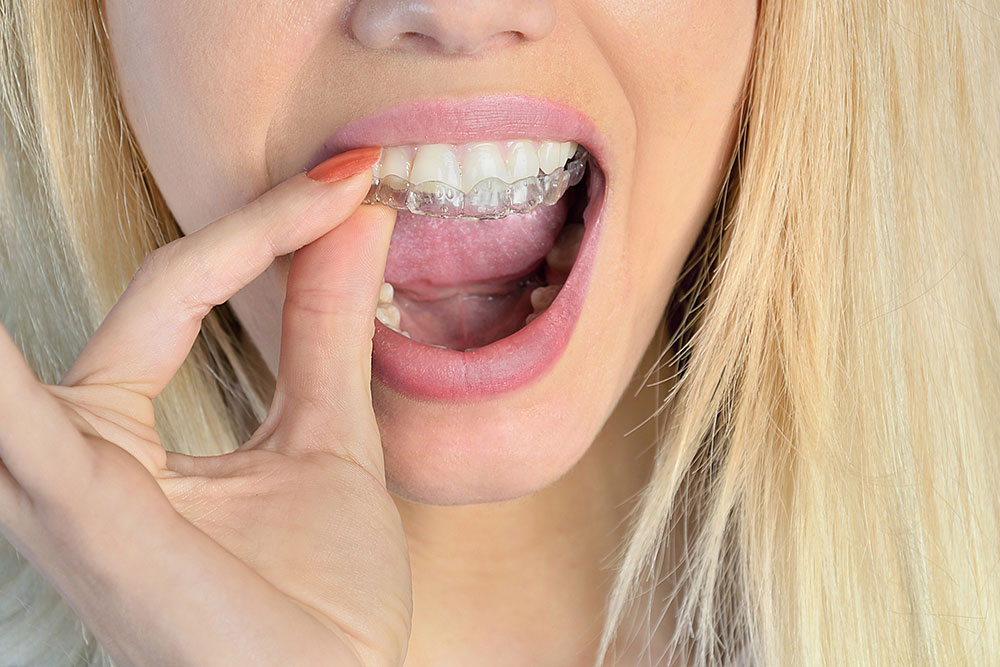Nightguards
 At Northern Colorado Prosthetic Dentistry, our prosthodontist, Dr. Andrew Bock is proud to provide patients with specialized treatment for a variety of dental and facial issues using prosthetic dental devices, such as nightguards.
At Northern Colorado Prosthetic Dentistry, our prosthodontist, Dr. Andrew Bock is proud to provide patients with specialized treatment for a variety of dental and facial issues using prosthetic dental devices, such as nightguards.
What Is a Nightguard?
Sometimes called an oral splint, a nightguard is a plastic splint that is worn over the teeth (usually just the top arch) while a patient sleeps. Depending on the issues that the nightguard is intended to address, the nightguard might provide a simple, thin plastic layer of protection for the teeth or it might be a thicker device designed to hold the mouth and jaw in a specific position.
Why You Might Need a Nightguard
There are two primary reasons why Dr. Bock might recommend a nightguard for you.
Temporomandibular Joint Disorder
Temporomandibular joint disorder (TMD) is a fairly common problem that is characterized by the misalignment of the temporomandibular joint that is responsible for moving the jawbones.
TMD can cause a variety of unpleasant symptoms such as:
- Lockjaw
- Jaw, mouth, face, neck, and shoulder pain
- Teeth sensitivity
- Popping, clicking, and/or grinding inside the temporomandibular joints
- Frequent headaches and migraines
- Bruxism
Several factors can cause and contribute to TMD including malocclusion (improper bite), crooked teeth, anatomy, and bruxism.
Sleep Bruxism
Sleep bruxism is another common reason why you might need a nightguard. Sleep bruxism is a condition with which individuals grind their teeth, clench their jaws together, or a combination of both while they sleep. Bruxism causes several problems and symptoms for patients including:
- Excessively worn tooth enamel
- Worn chewing surfaces of teeth
- Chipped or cracked teeth
- Damaged dental work
- Jaw, face, neck, and shoulder pain
- Teeth sensitivity
- Soft tissue injuries to the cheeks and tongue
- Frequent headaches and migraines
- Temporomandibular joint disorder
The exact cause of sleep bruxism is not understood. However, it tends to be associated with genetics, daytime anxiety, alcohol use, and temporomandibular joint disorder.
Minimize Symptoms and Protect Your Teeth With a Nightguard
Nightguards can help address TMD by holding the jawbones and temporomandibular joint in a more natural, relaxed position while a person sleeps.
A nightguard can also help to address sleep bruxism by protecting the teeth from excessive wear and tear. A nightguard will help to position the jawbones in a way that also mitigates a person’s ability to grind and clench their teeth together.
What to Expect When Getting a Nightguard
The process of getting a nightguard is simpler than ever thanks to digital technology. When a patient comes to NCPD to be fitted for a nightguard, the first step is to take digital impressions of the patient’s teeth with our intraoral scanner. This quick 3D image capture enables us to quickly design a nightguard for our patient that offers a perfectly personalized comfortable fit.
Our patient’s mouthguard can then be printed right in our office using our in-house 3D printer.
Once ready, we have our patient try on the nightguard and assess the way it feels and fits. If any adjustments need to be made, we can take care of them before the patient goes home with their new nightguard.
Custom-Made Nightguards in Loveland, Colorado
At Northern Colorado Prosthetic Dentistry, we’re pleased to provide our patients with a quick, simple, and streamlined treatment process for addressing TMJ disorder and protecting their teeth and dental prosthetics from the excessive wear and tear of sleep bruxism.
To learn more about nightguards or to schedule a nightguard consultation with our prosthodontist, Dr. Andrew Bock, we welcome you to contact our office in Loveland, Colorado today.





